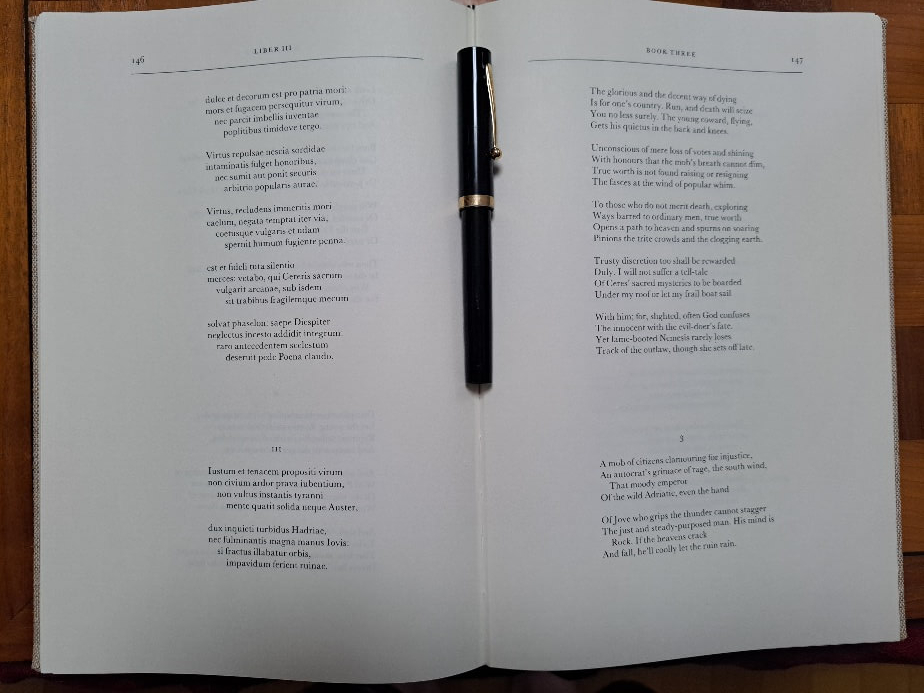"It is Sweet and Decent to Die for One's Country"

In my previous post about the Strange Case of Dr. Jeckyll and Mr. Hyde I discussed the meaning of the Latin phrase "pede claudo" ("on a limping foot") which Mr. Utterman utters while wondering what the motive could be for Dr. Jeckyll's strange attachment to the ghastly Mr. Hyde.
https://hive.blog/alive/@hirohurl/on-reading-the-strange-case-of-dr-jekyll-and-mr-hyde
The phrase means "on a limping foot" and is used to suggest that the goddess of punishment (Poenia) eventually catches up with a malefactor. The phrase is found in one of the Odes of Horace, which every educated chap would have studied - or had flogged into him - in his schooldays.
Who Was Horace?
Quintus Horatius Flaccus was one of ancient Rome's most famous and celebrated poets. He was born in 65 BC and died in 6 BC during the reign of Augustus Caesar, the first Roman emperor. His poems celebrate the transition from Republic to Empire and some were commissioned by the emperor himself.
He was admired for his style in the middle ages and in the Renaissance and the Neo-Classical 18th century, but not so much by the Romantics.
A sense of déjà vu
After I'd published my previous blog post, I remembered that I had a rather fine Folio Society dual-text edition of "The Odes of Horace" and so I looked up the ode in question as it gave me a sense of déjà vu... - an itch that I needed to scratch...
And sure enough! There it was in that very same ode - perhaps the most famous line in all of Horace's odes, and indeed in all of Latin poetry, at least to pupils of my generation who went through the English state school system and "did" some of the British Poets of the First World War such as Wilfred Owen in English lessons:
dulce et decorum est pro patria mori...
(Sweet and decent it is for [one's] country to die...)
Wilfred Owen and Horace
That line is the title of one of Wilfred Owen's most famous poems, which portrays the horror of a gas attack, and makes up the concluding couplet:
My friend, you would not tell with such high zest
To children ardent for some desperate glory,
The old Lie: Dulce et decorum est
Pro patria mori.
https://en.wikipedia.org/wiki/Dulce_et_Decorum_est

Wilfred Owen (18th March 1893–4th November 1918)
I was going to talk about how Wilfred Owen would have been as familiar with Horace's ode III.2 as Robert Louis Stevenson was, but it turns out that Owen's Latin studies were disrupted at the age of fourteen when his family moved to a different town and he enrolled in a technical school that did not offer Latin classes. It is even possible that he did not know the origin of the Latin "tag" he quoted in his poem because,
"by the late nineteenth century, the phrase dulce et decorum est had taken on a life of its own as a stirring sentiment to use in patriotic stories and poems and as an inscription for war memorials."
https://writersinspire.org/content/dulce-et-decorum-est-wilfred-owen’s-latin
In Praise of Roman Virtue and Discipline
So far, we have discovered that Horace's ode tells us that it is sweet and proper to die for our country and that retribution comes limping but will eventually track you down. How on earth are those two ideas connected?
That is what I will explore in the rest of this blog post by offering as plain and simple a translation of Horace's ode as possible, based on the poetic translation by James Michie in my Folio Society edition,

and on a 1919 translation available here,
https://www.perseus.tufts.edu/hopper/text?doc=Perseus%3Atext%3A1999.02.0025%3Abook%3D3%3Apoem%3D2
and this translation by A. Kline:
https://www.poetryintranslation.com/PITBR/Latin/HoraceOdesBkIII.php#anchor_Toc40263847
As the sentences run over from one stanza to another, I'll work sentence by sentence rather than verse by verse.
First sentence (Stanzas 1-2): Roman Training
Angustam amice pauperiem pati
robustus acri militia puer
condiscat / et Parthos ferocis
vexet eques metuendus hasta /
vitamque sub divo et trepidis agat
in rebus.
My translation:
Let the boy willingly endure harsh poverty and grow strong through tough military service /
And let him, a fearsome horseman, harass the savage Parthians with his lance, /
And live his life under the open sky, in the midst of danger.
Second Sentence (Stanzas 2-3): How a Roman Dismays the Enemy's Womenfolk
Illum ex moenibus hosticis
matrona bellantis tyranni
prospiciens et adulta virgo /
suspiret, eheu, ne rudis agminum
sponsus lacessat regius asperum
tactu leonem, / quem cruenta
per medias rapit ira caedes.
My translation:
That man is watched from the enemy walls by the wife of the warlike tyrant, and his grown-up daughter /
who sighs, Alas, may my royal fiancé, untrained in war, not provoke the savage lion by touching him /
whom a bloody rage carries through the heart of the slaughter.
Third Sentence: Die as a Roman or as a Coward (Verse 4)
Dulce et decorum est pro patria mori: /
mors et fugacem persequitur virum
nec parcit inbellis iuventae
poplitibus timidove tergo.
My translation:
It is sweet and decent to die for one’s country: /
Death also pursues the fleeing man nor spares the knees of unwarlike youth nor the timid back.
Fourth Sentence: True Virtue is Unmoved by Opinion (Stanza 5)
Virtus, repulsae nescia sordidae,
intaminatis fulget honoribus /
nec sumit aut ponit securis
arbitrio popularis aurae.
My translation:
Virtue, knowing no sordid setback, shines with unstained honours /
nor does it take up or lay down axes on the whim of the popular breeze.
Fifth Sentence: Virtue Opens a Forbidden Way to Heaven (Stanza 6)
Virtus, recludens inmeritis mori
caelum, negata temptat iter via /
coetusque volgaris et udam
spernit humum fugiente pinna.
Virtue, opening heaven to those who do not deserve to die, attempts a forbidden** path /
and spurns the vulgar crowd and the damp [or "bloodied" (Kline)] earth with a soaring wing.
** "forbidden" to the coward and the vulgar crowd.
Sixth Sentence: Discretion Shall Preserve Thee (Stanzas 7-8)
Est et fideli tuta silentio
merces: / vetabo, qui Cereris sacrum
volgarit arcanae, sub isdem
sit trabibus fragilemque mecum
solvat phaselon; / saepe Diespiter
neglectus incesto addidit integrum, /
raro antecedentem scelestum
deservit pede Poena claudo.
There is also a sure reward for faithful silence: /
I shall forbid whoever has revealed the secret rite of Ceres** to be under the same roof or to set sail in the same fragile boat with me; /
Often, when Jupiter has been neglected, he has added the innocent to the guilty, /
[Yet] Punishment, though lame of foot, rarely fails to catch the guilty who run ahead.
** Ceres = Roman goddess of grain and fertility.
The Link Between a Virtuous Death and Limping Punishment
Horace's ode takes us on a journey through the various modes of virtue. Keep in mind that by "virtue" we are speaking of "manliness," courage, and strength of masculine character.
The first mode of virtue that a Roman boy must learn is martial virtue, and that the most honourable death is to die in battle fighting for the patria, the land of your fathers, whereas the most dishonourable death is to die with your back to the pursuing enemy.
The next mode of virtue is to take a stand unmoved by popular opinion, which finds its most extreme expression in Shakespeare's tragic Roman hero, Coriolanus.
Ah yes, sticking to the virtuous path can be deadly, but an unmerited death opens up a path to heaven forbidden to the common herd. The man of virtue becomes godlike.
Another mode of virtue is the discipline of discretion and loyalty, especially loyalty to the rites of the Roman gods. One neither blabs nor abides a blabbermouth...
And for good reason... when the gods punish they don't have any qualms about inflicting collateral damage. A virtuous man will respect the gods and avoid those who have offended them, for he knows that Poenia, though she limp, never stops pursuing the offenders.
He who practices the Roman virtues shall live with courage and discretion, avoid those who offend the gods, and in his sweet and fitting death he shall be rewarded with fame, glory, and a sweet spot in the green fields of Elysium, if Virgil is to be believed.
Cheers!
David Hurley
#InspiredFocus
Photo of Wilfred Owen by Allex Langié - Own work, CC BY-SA 3.0,
https://commons.wikimedia.org/w/index.php?curid=29655076